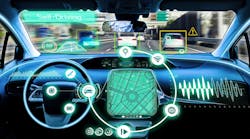Denso Takes Stake in Infineon with Eye on Automated-Driving Proving Ground
To bolster its automotive business and accelerate development of next-generation vehicle systems technology, such as automated driving, Japanese automotive components supplier Denso has taken a financial stake in Infineon Technologies. With the investment, Infineon Technologies’ semiconductor technologies will combine with Denso’s in-vehicle capabilities “to accelerate the development of new and emerging mobility solutions.”
“We would like to establish optimal semiconductor solutions for in-vehicle electronics systems through strong partnerships with semiconductor companies in order to enhance the competitiveness of automated driving and electrification systems,” says Hiroyuki Ina, Senior Executive Director of Denso Corp.
Infineon noted that the two companies have been working together for more than 10 years and that Denso wanted to underline the partnership with a small equity stake. “We are very pleased to expand our already well-established relationship with Denso,” says Dr. Reinhard Ploss, CEO of Infineon. “Our collaboration with Japan’s largest and world-leading automotive system supplier is strengthening our links with the Japanese industry as well as our position in the Japanese and global semiconductor market. We welcome Denso becoming a shareholder.”
Infineon reported that the Denso equity stake was in the “range of a mid-double-digit million Euro amount.”
In his comments, Denso’s Ina pointed to his company’s long-term commitment to mobility, especially in the areas of automated driving, connected cars, and electrification. He also said the investment will enhance and accelerate development of hardware and software-based solutions in the fields of safety and environmental protection.
Artist’s rendering of Denso’s planned automated driving R&D facility. (Source: Denso)
In October, Denso, the world’s second largest mobility supplier, said it plans to establish a new facility at Haneda Airport in Tokyo to develop and test automated driving technologies (see figure). The facility, which is expected to be complete by June 2020, will feature a building and proving ground for mobility systems R&D.
This new location is part of the Haneda Airport Unused Land Zone 1 Redevelopment Project, a broader initiative led by Tokyo’s Ota City, Denso, and other entities to transform underutilized space at the airport into a hub for leading-edge technology development and mixed-use cultural facilities. The new facility will include a building to develop prototypes and maintain test vehicles, as well as a proving ground to conduct live, in-vehicle tests.
The Haneda area is designated a National Strategic Special Zone. It’s been described as a “regulatory sandbox system,” meaning a controlled environment without existing regulations. A limited number of project participants can verify their innovations, including new technologies for a limited period of time, in order to collect data to rapidly obtain test results and determine if regulatory reform is needed. Denso said it will utilize the National Strategic Special Zone system and work with manufacturers in Ota City to develop and test prototypes more seamlessly and speed development of automated driving technology.
Denso has also established an automated driving R&D office near Shinagawa Station in Tokyo's Minato district to promote collaboration and open innovation with its development partners, including automakers, universities, research institutes and startups.


